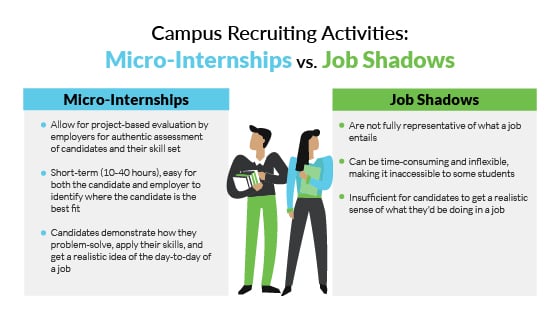
Three reasons why job shadows fall short as a recruiting strategy
Many recruiters believe having early-career professionals job shadow is a good way to judge if a candidate is a good fit for a role. Job shadows often allow students to see what professionals in their desired field do daily, decipher if their skill set is sufficient to meet a position's needs, and learn about the type of roles available in their industry of interest. However, job shadows pose challenges that make them fall short as a recruiting strategy.
Let's dive into what a job shadow is and how it might be holding you back from finding the right talent.
In this article, we'll discuss three main reasons why job shadows fall short as a recruiting strategy for most businesses.
What is a job shadow?
A job shadow is an arrangement where a student spends one or more days observing someone at work. They typically follow that person around and ask questions to learn about what that person does daily while also getting an inside look at what it's like to work in that industry. Job shadows are often seen as a precursor to an apprenticeship or internship program and range between a few hours to a few days.
Some of the reasons why job shadows fall short as a recruiting strategy are:
Job shadows are not always representative of the job
The professional being shadowed is limited to how much they can show a student while on the job. After all, the workday is busy, and every day is different. A job shadow may not always be the most comprehensive glimpse into a role and can give students an inaccurate picture of what the job is like and its expectations.
Students need to understand that a job shadow is only a snapshot of what the job is like and that there will be other aspects of the job that they won't see during their shadowing experience.
Job shadows are time-consuming
Job shadows can be time-consuming for both the employer and the student. The employer has to dedicate someone to showing the student around and answering their questions, which can hurt productivity. In addition, depending on how long the shadow is, it can also take up a significant amount of time for the student. A student may have to miss class or work to participate, which can disrupt their schedule and may not be worth it if they only get a limited view of the job. The time commitment can lead to students not participating in job shadows altogether.
Job shadows are not students' preferred way to engage with employers
To help plan an effective campus recruiting strategy, we go directly to college students nationwide to understand how they prefer to engage with prospective employers and learn about roles. Our latest student sentiment survey revealed college student's top four ways of engaging with employers to be:
- Real, paid work experience with a company
- Understanding the responsibilities of a role through hands-on opportunities
- Connecting with professionals in their chosen field
- Building job-specific skills for a certain field/ employer
While job shadows offer the opportunity to connect with professionals, they are limited to observing rather than hands-on, real work leading to skills development that students prefer.
Connecting with college students the way they prefer to engage is more accessible than ever. Here at Parker Dewey, Micro-Internships offer a meaningful professional learning experience and practical work related to a student's field of study or career interest. Since launching in 2016, Parker Dewey has defined Micro-Internships as: project-based, professional, paid opportunities for early-career talent.

If you're interested in attracting top early career talent, consider implementing Micro-Internships into your recruiting strategy. Micro-internships are short-term, project-based experiences that give students a taste of what it's like to work for your company. Plus, micro-internships can be completed online, making them more accessible for students with busy schedules.
As the largest network of highly motivated college students and recent graduates who are excited to complete short-term, professional assignments, we know internships!
Our mission is to provide meaningful opportunities for Career Launchers to add to their resumes while helping organizations get work done. If you're passionate about this too, please join our email newsletter Hire Learnings, and follow us on social!


.png)

